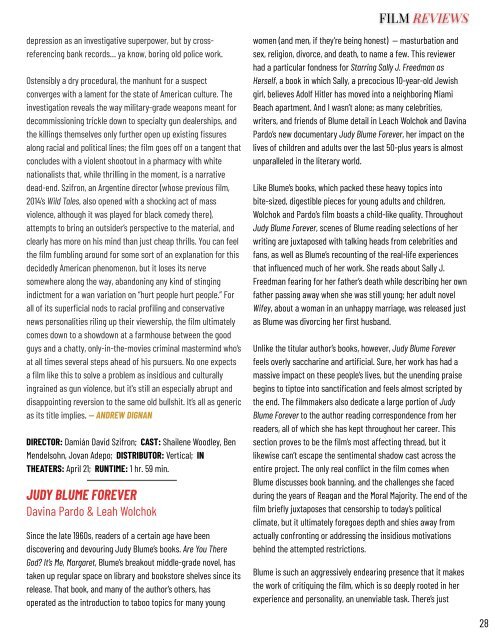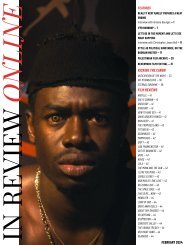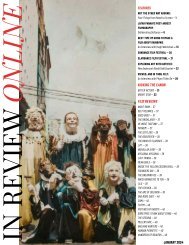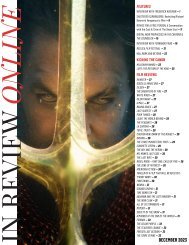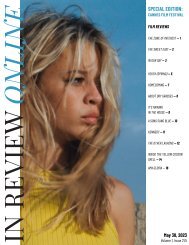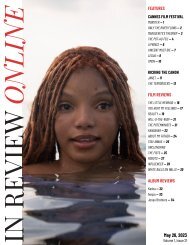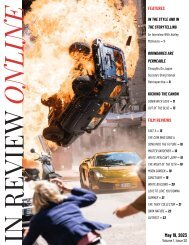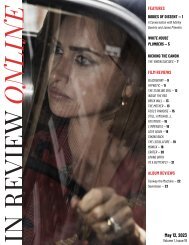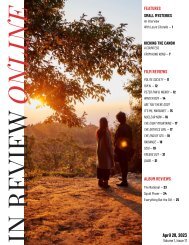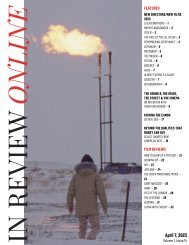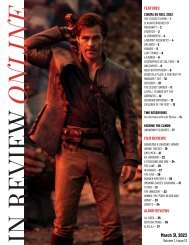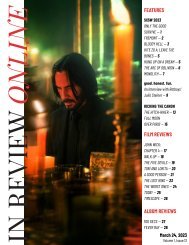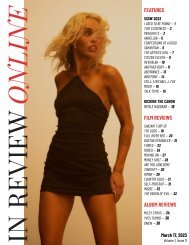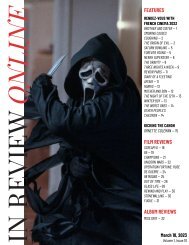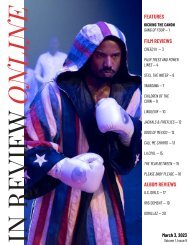InRO Weekly — Volume 1, Issue 16
Create successful ePaper yourself
Turn your PDF publications into a flip-book with our unique Google optimized e-Paper software.
FILM REVIEWS<br />
depression as an investigative superpower, but by crossreferencing<br />
bank records… ya know, boring old police work.<br />
Ostensibly a dry procedural, the manhunt for a suspect<br />
converges with a lament for the state of American culture. The<br />
investigation reveals the way military-grade weapons meant for<br />
decommissioning trickle down to specialty gun dealerships, and<br />
the killings themselves only further open up existing fissures<br />
along racial and political lines; the film goes off on a tangent that<br />
concludes with a violent shootout in a pharmacy with white<br />
nationalists that, while thrilling in the moment, is a narrative<br />
dead-end. Szifron, an Argentine director (whose previous film,<br />
2014’s Wild Tales, also opened with a shocking act of mass<br />
violence, although it was played for black comedy there),<br />
attempts to bring an outsider’s perspective to the material, and<br />
clearly has more on his mind than just cheap thrills. You can feel<br />
the film fumbling around for some sort of an explanation for this<br />
decidedly American phenomenon, but it loses its nerve<br />
somewhere along the way, abandoning any kind of stinging<br />
indictment for a wan variation on “hurt people hurt people.” For<br />
all of its superficial nods to racial profiling and conservative<br />
news personalities riling up their viewership, the film ultimately<br />
comes down to a showdown at a farmhouse between the good<br />
guys and a chatty, only-in-the-movies criminal mastermind who’s<br />
at all times several steps ahead of his pursuers. No one expects<br />
a film like this to solve a problem as insidious and culturally<br />
ingrained as gun violence, but it's still an especially abrupt and<br />
disappointing reversion to the same old bullshit. It’s all as generic<br />
as its title implies. <strong>—</strong> ANDREW DIGNAN<br />
DIRECTOR: Damián David Szifron; CAST: Shailene Woodley, Ben<br />
Mendelsohn, Jovan Adepo; DISTRIBUTOR: Vertical; IN<br />
THEATERS: April 21; RUNTIME: 1 hr. 59 min.<br />
JUDY BLUME FOREVER<br />
Davina Pardo & Leah Wolchok<br />
Since the late 1960s, readers of a certain age have been<br />
discovering and devouring Judy Blume’s books. Are You There<br />
God? It’s Me, Margaret, Blume’s breakout middle-grade novel, has<br />
taken up regular space on library and bookstore shelves since its<br />
release. That book, and many of the author’s others, has<br />
operated as the introduction to taboo topics for many young<br />
women (and men, if they’re being honest) <strong>—</strong> masturbation and<br />
sex, religion, divorce, and death, to name a few. This reviewer<br />
had a particular fondness for Starring Sally J. Freedman as<br />
Herself, a book in which Sally, a precocious 10-year-old Jewish<br />
girl, believes Adolf Hitler has moved into a neighboring Miami<br />
Beach apartment. And I wasn’t alone; as many celebrities,<br />
writers, and friends of Blume detail in Leach Wolchok and Davina<br />
Pardo’s new documentary Judy Blume Forever, her impact on the<br />
lives of children and adults over the last 50-plus years is almost<br />
unparalleled in the literary world.<br />
Like Blume’s books, which packed these heavy topics into<br />
bite-sized, digestible pieces for young adults and children,<br />
Wolchok and Pardo’s film boasts a child-like quality. Throughout<br />
Judy Blume Forever, scenes of Blume reading selections of her<br />
writing are juxtaposed with talking heads from celebrities and<br />
fans, as well as Blume’s recounting of the real-life experiences<br />
that influenced much of her work. She reads about Sally J.<br />
Freedman fearing for her father’s death while describing her own<br />
father passing away when she was still young; her adult novel<br />
Wifey, about a woman in an unhappy marriage, was released just<br />
as Blume was divorcing her first husband.<br />
Unlike the titular author’s books, however, Judy Blume Forever<br />
feels overly saccharine and artificial. Sure, her work has had a<br />
massive impact on these people’s lives, but the unending praise<br />
begins to tiptoe into sanctification and feels almost scripted by<br />
the end. The filmmakers also dedicate a large portion of Judy<br />
Blume Forever to the author reading correspondence from her<br />
readers, all of which she has kept throughout her career. This<br />
section proves to be the film’s most affecting thread, but it<br />
likewise can’t escape the sentimental shadow cast across the<br />
entire project. The only real conflict in the film comes when<br />
Blume discusses book banning, and the challenges she faced<br />
during the years of Reagan and the Moral Majority. The end of the<br />
film briefly juxtaposes that censorship to today’s political<br />
climate, but it ultimately foregoes depth and shies away from<br />
actually confronting or addressing the insidious motivations<br />
behind the attempted restrictions.<br />
Blume is such an aggressively endearing presence that it makes<br />
the work of critiquing the film, which is so deeply rooted in her<br />
experience and personality, an unenviable task. There’s just<br />
28


